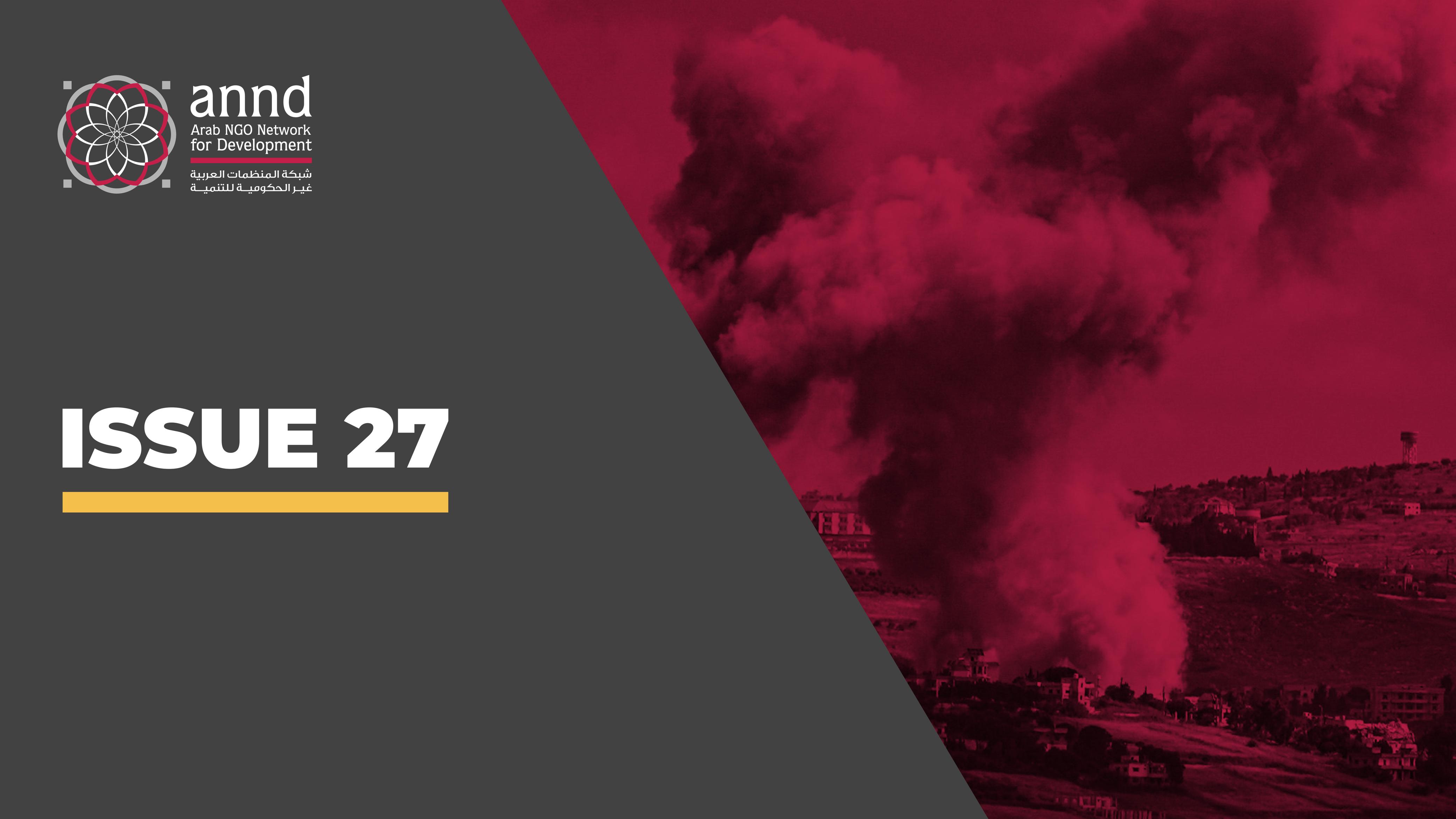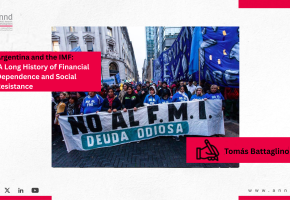A Region on Fire
Issue 27 - October 23, 2024
Silence about the crimes committed and the continued military support for Israel encourage it to persist in its destructive war.
Gaza: Extermination and war crimes continue in Jabalia.
Philippe Gautier, Registrar of the International Court of Justice (ICJ), stated that the court is currently dealing with an unprecedented number of cases, especially with the ongoing conflict in the Middle East. In an interview with UN News, Gautier stressed that Israel’s prolonged occupation and policies that deny the Palestinian people the right to self-determination have legal consequences. According to him, the court’s advisory opinion requires Israel to end the occupation as soon as possible, halt the construction of new settlements, and fully compensate for the damages it has caused.
Lebanon: Negotiation under fire as an alternative to diplomacy, with no internal political pathway out of the deadlock.
The destructive escalation in Lebanon seems to be pre-emptive of an Israeli strike on Iran and its potential response. Bombings and evacuation warnings target new areas daily, with Israel's strategy deliberately displace large populations to increase pressure inside Lebanon. Foreign diplomats' visits are merely delivering conditions and pushing for full implementation of international resolutions. No Lebanese political solution is in sight to enable the state to act as a legitimate negotiator, avoid further destruction, and present a national Lebanese vision to end the war.
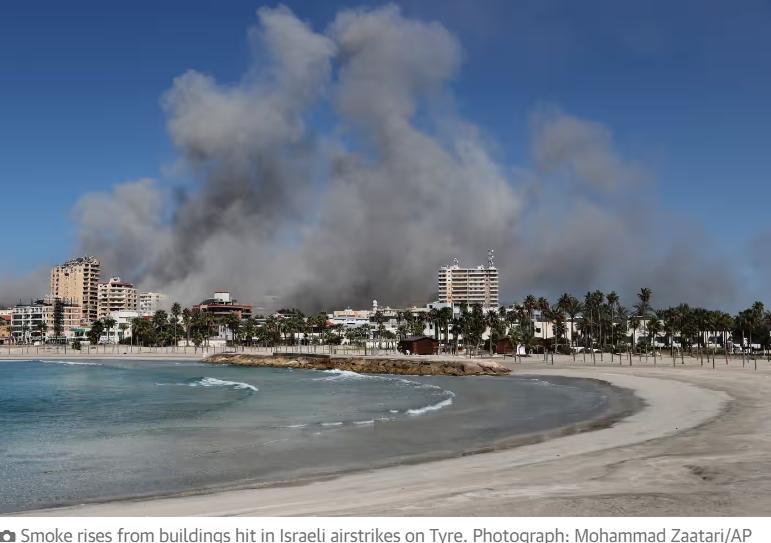
Gaza will need 350 years for its struggling economy to return to its precarious prewar level
UNRWA Commissioner-General Philippe Lazzarini said today that one year of war knocks Gaza back to the early 1950’s. The war has devastated the Palestinian economy and left the population in poverty, rolling back life indicators by about 70 years.
The U.N. Conference on Trade and Development said in a
report released Monday that if the war ends tomorrow and Gaza returns to the status quo before Hamas’ Oct. 7, 2023, attack on Israel, it could take 350 years for
its battered economy to return to its precarious prewar level.
According to the official UN website, United Nations housing expert Balakrishnan Rajagopal stated that by January 2024, between 60% and 70% of homes in Gaza would have been destroyed, with the northern region experiencing a destruction rate of 82%.
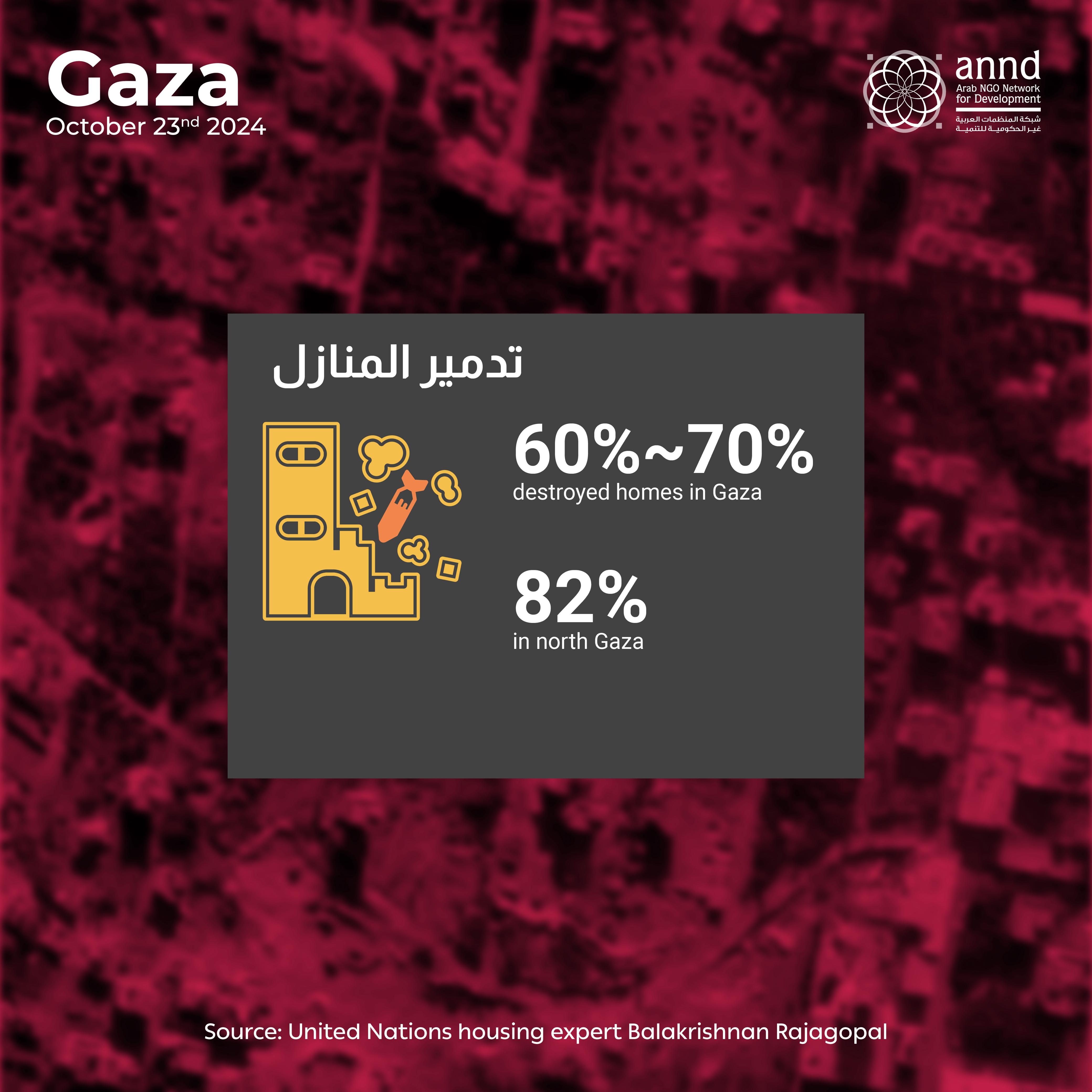
Doctors Without Borders stated that northern Gaza faces all forms of death due to the relentless Israeli bombardment. Gaza's health director said that Israel's actions in the north are full-fledged war crimes, with over 1,000 medical staff killed and hospitals targeted as part of a plan to force people out of the north. Hospitals will become mass graves if Israel's crimes continue to besiege them, preventing access to medicine, food, and water while the world remains silent. He also reported that Israel had committed six massacres in the past 24 hours, with 74 martyrs and 130 injured arriving at hospitals.
Gaza’s Civil Defense spokesperson, said Israel’s army is clearing out Jabalia block by block, with hundreds of civilians trapped in their homes under severe danger. The army has deliberately destroyed large residential areas and is now focusing on shelters in Beit Lahia, near Jabalia Camp, while also destroying areas around Kamal Adwan Hospital and blocking all roads to it.
On the 383rd day of Israel’s assault on Gaza, 42 Palestinians were martyred in airstrikes since dawn, 37 of them in the north. The Israeli army also announced the arrest of 150 civilians in the northern part of the Strip as part of their encirclement of Jabalia.
The director of Kamal Adwan Hospital called for the opening of a safe humanitarian corridor to bring in fuel and medical supplies. More than 1.7 million displaced people in central and southern Gaza are on the brink of famine due to Israel’s siege.
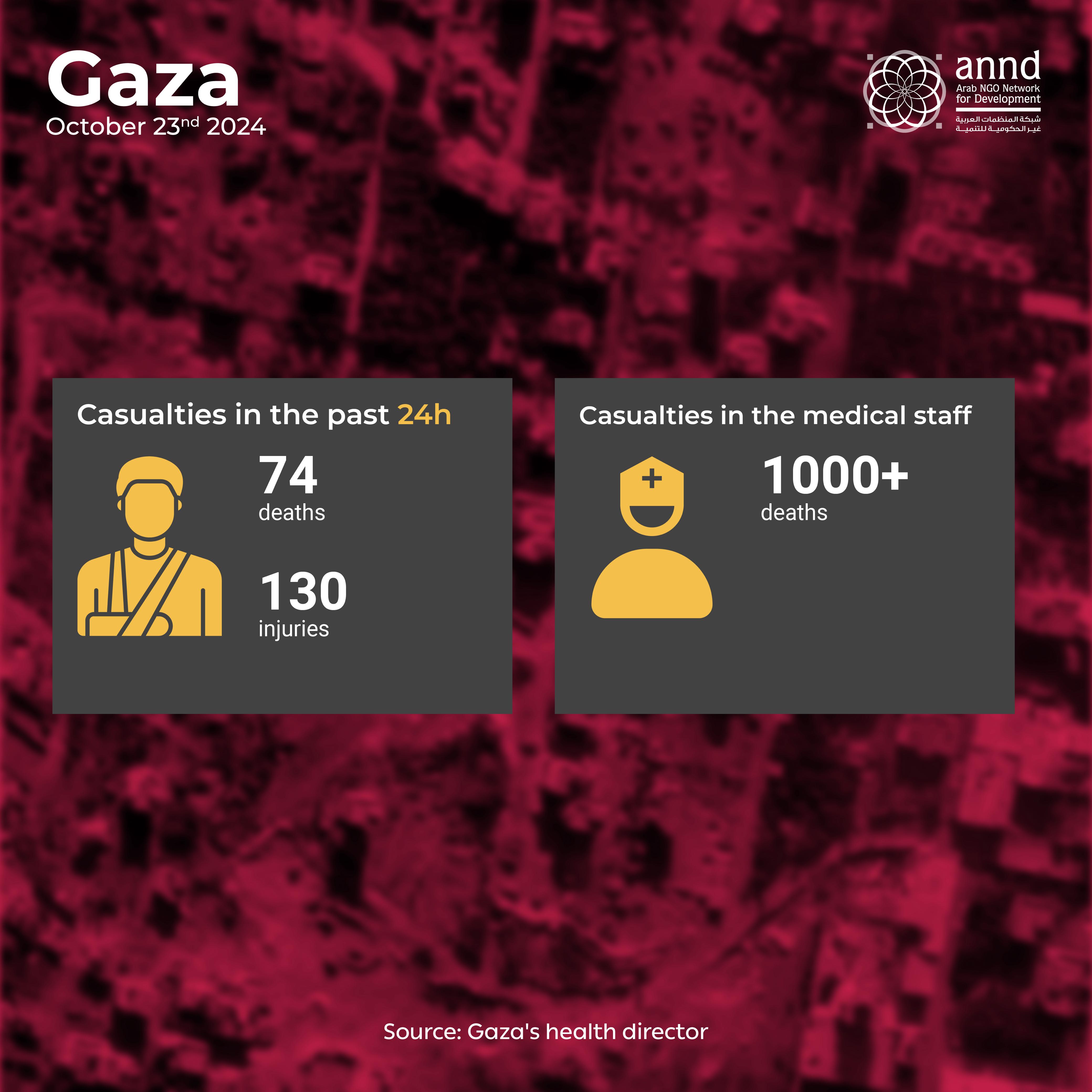
Battlefield Developments in Lebanon
A month into the Israeli air invasion, a destructive fire belt surrounds the historic city of Tyre. In less than an hour after issuing an evacuation warning, the Israeli army launched airstrikes that systematically demolished entire residential blocks, institutions, health centers, and streets—mirroring its actions in Nabatieh.
Israeli airstrikes continued in southern Lebanon, the Beqaa, and Beirut's southern suburbs. The Israeli military reported 22 soldiers injured in ground battles in southern Lebanon over the past 24 hours. Haaretz's military correspondent reported that, as of yesterday, the Israeli army had captured ten Hezbollah fighters.
Israeli bombardment resumed on Wednesday evening, targeting areas in Beirut's southern suburb, causing large fires in Al-Laylaki and the destruction of several buildings. One airstrike targeted an apartment in what appeared to be an assassination attempt on a Hezbollah leader.
Hezbollah announced it had launched a missile barrage at the Glilot base of Unit 8200, an Israeli military intelligence unit, in the suburbs of Tel Aviv and attacked northern Israel and soldier gatherings at various points. Hezbollah also repelled Israeli ground incursions, particularly in the Qouzah area.
Over the past 24 hours, 74 airstrikes and shellings were recorded in various parts of Lebanon, mostly in the south and Nabatieh, bringing the total number of attacks since the start of the assault to 10,849. The Ministry of Health reported 28 martyrs and 139 wounded in the last 24 hours, raising the total number of martyrs to 2,574 and the wounded to 12,001 since the assault began.
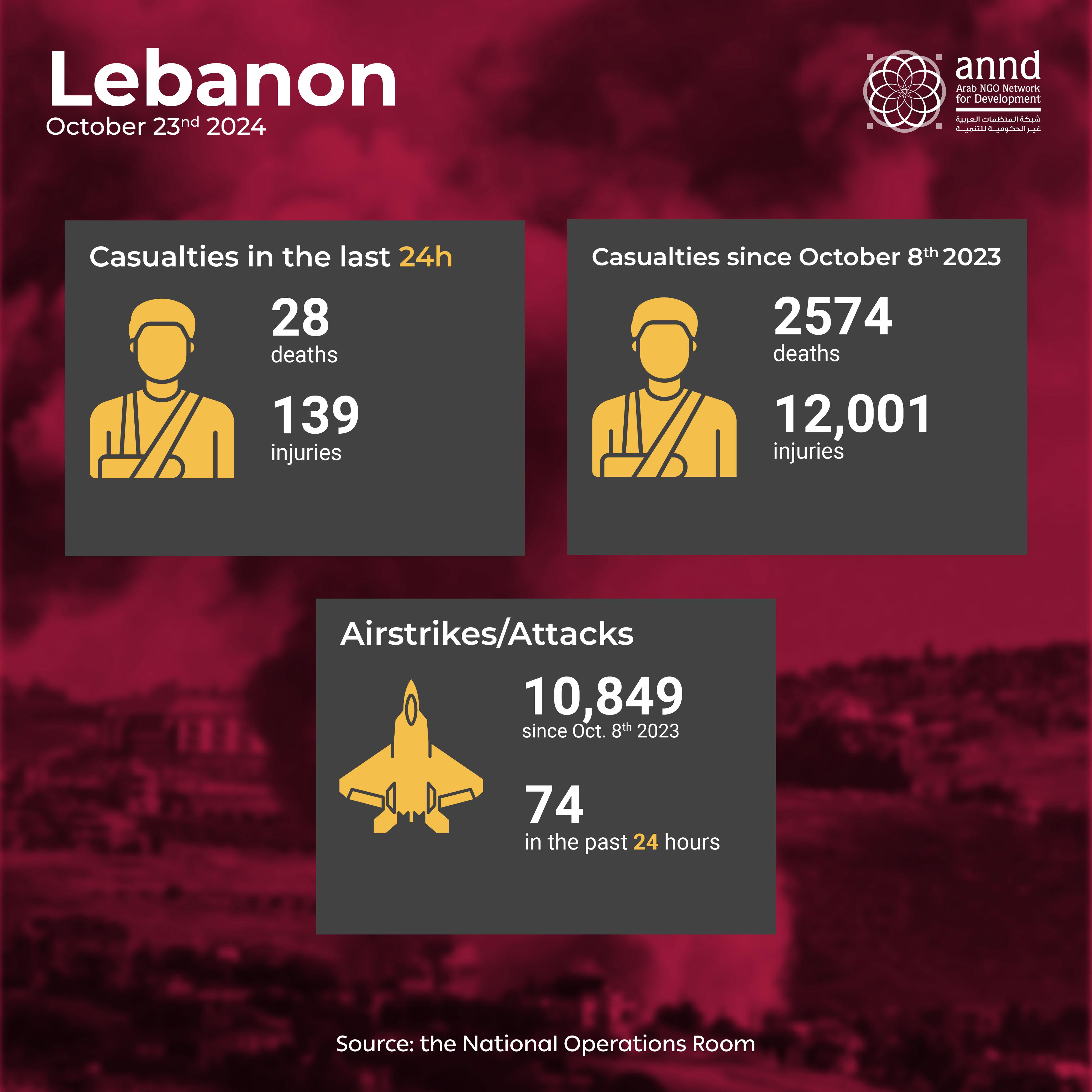
Political Positions
Lebanese Prime Minister Najib Mikati arrived at the Elysee Palace, where he was received by French President Emmanuel Macron.
Lebanese Forces leader Samir Geagea told Al Arabiya that the war in Lebanon is between Israel and Iran and rejected some of US envoy Amos Hochstein's proposals as infringing on Lebanon's sovereignty. He emphasized the need for the Lebanese government to commit to implementing international resolutions 1559, 1680, and 1701 to avoid worse outcomes. He accused Speaker Nabih Berri and Prime Minister Mikati of refusing to implement the resolutions or asking Hezbollah to hand over its weapons to the state, adding that there’s no time for "tricks and maneuvers" regarding the implementation of international resolutions.
Caretaker Foreign Minister Abdallah Bou Habib met with Audrey Azoulay, Director-General of UNESCO in Paris. Bou Habib emphasized the importance of protecting and preserving archaeological sites throughout Lebanon, including those in southern Lebanon, particularly Tyre, which was attacked today, as these sites represent a heritage for all humanity:
Hezbollah officially mourned the death of the head of its Executive Council, Hashem Safieddine, the second-ranking figure in the party and the successor to Hassan Nasrallah as Secretary-General. This follows the Israeli army’s announcement yesterday that he and 23 others were killed in an airstrike conducted on October 4.
Humanitarian Response
The United Nations announced that the war between Israel and Hezbollah is expected to reduce Lebanon's GDP by nine percent, with the scale of fighting and the war's economic fallout surpassing that of 2006. A rapid assessment by the United Nations Development Programme (UNDP) on the conflict's impact on Lebanon’s GDP was released ahead of a summit hosted by France to rally international support for Lebanon. The assessment predicted that if the conflict continues until the end of 2024, it will increase the government's financial needs by 30 percent, in a country already burdened by a severe economic and financial crisis.
An independent working group estimated the economic damage of the war to Lebanon at $20 billion, noting that it has destroyed or disrupted approximately 50,000 registered businesses (equivalent to 60% of the total companies in Lebanon) and more than a quarter of Lebanon's agricultural land. The group projected that the percentage of people living in extreme poverty will increase to reach at least 80% in the areas directly targeted by Israeli aggression.
Nationally, it is expected that the number of people living in extreme poverty will rise from around 1.6 million before the war to more than 3 million, which is 60% of the population.
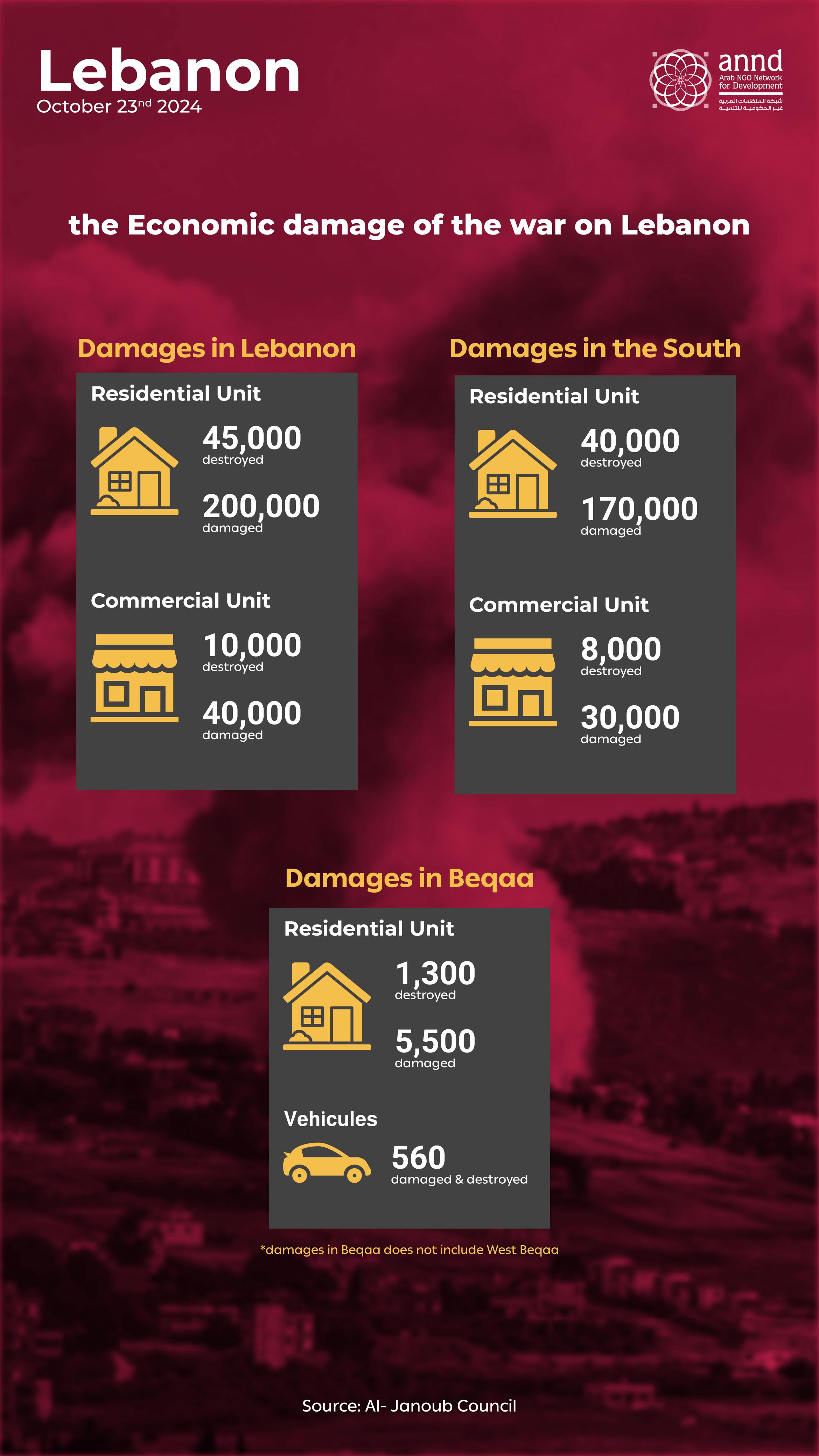
The eleventh relief plane arrived as part of the Saudi airlift.
A statement from the spokesperson for the German Chancellor announced that Germany will provide an additional 60 million euros (64 million USD) to assist the Lebanese people.
A total of 1,097 certified shelters for the displaced have been established, and 908 of these shelters have reached their maximum capacity. Displacement from areas facing daily attacks to safer regions continues, with the total number of registered displaced persons reaching 191,503 (44,247 families) in certified shelters. The highest percentage of displaced persons is in the governorates of Mount Lebanon and Beirut, but the actual number of displaced is believed to be much higher.
The United Nations High Commissioner for Refugees (UNHCR) identified 53,400 individuals as secondary displaced persons within Lebanon due to the conflict, and 30% of them (Lebanese) had crossed from Lebanon into Syria by October 21. Media outlets have reported some tensions between displaced persons and host communities, which are already under significant pressure. While these tensions remain limited, they are at risk of escalation. Many displaced persons are living in the open, and Syrians, in particular, face difficulties accessing collective shelters.
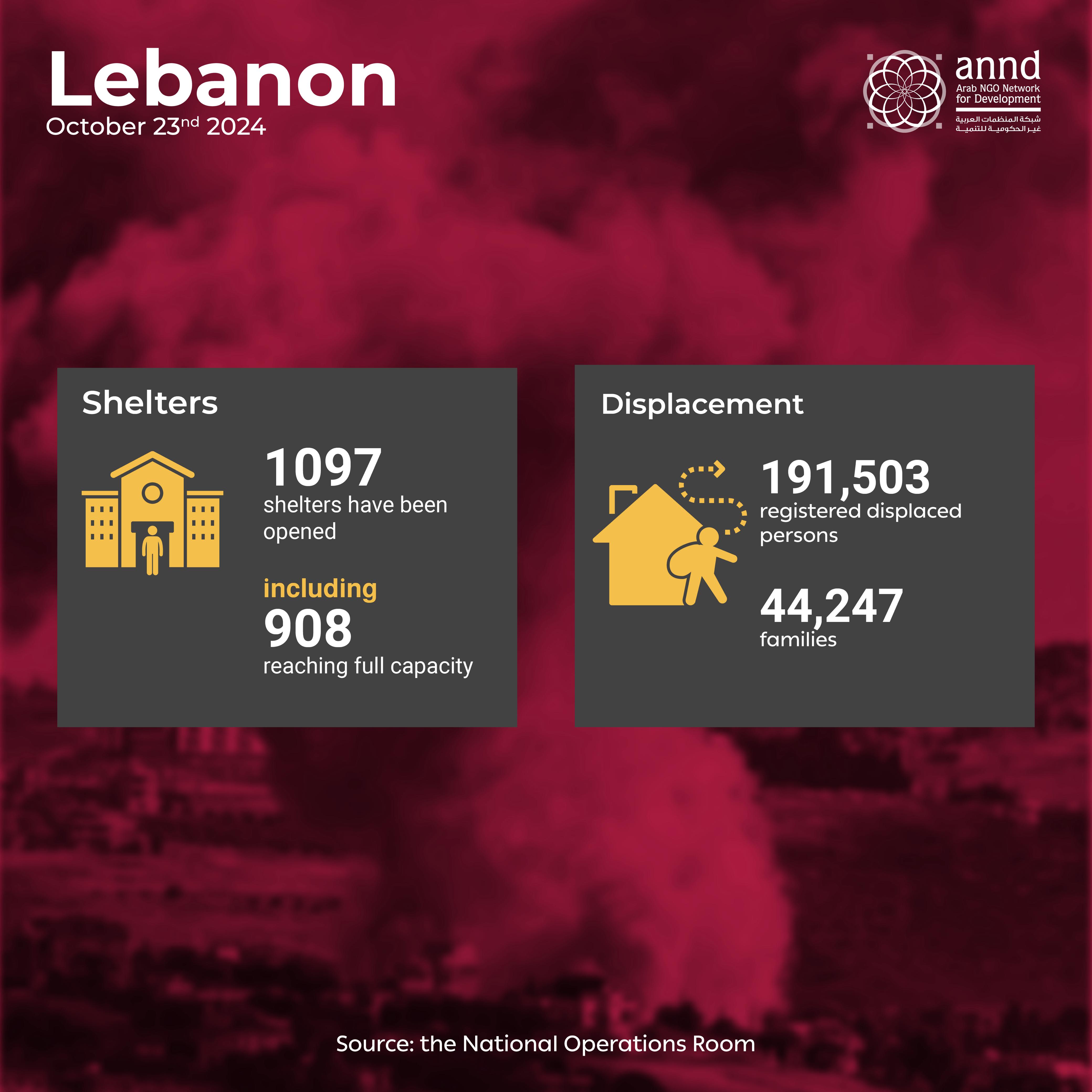
International Positions
U.S. Secretary of State Antony Blinken affirmed efforts to reach a lasting diplomatic solution for a ceasefire in Lebanon, working on new frameworks to release hostages and end the war. He mentioned that Yahya Sinwar was the main obstacle to the ceasefire negotiations in Gaza. Blinken stated that it’s time for Israel to turn its military success into a strategic success, which means having concrete plans for Gaza’s future after the war and reaching clear understandings about governance and security there. He emphasized a complete rejection of Israel reoccupying Gaza. He also said that Israel needs to do more to allow aid into Gaza and that this must be sustainable. Blinken stressed that Israel should respond to Iran’s attacks in ways that do not lead to greater escalation.
U.S. Defense Secretary Lloyd Austin announced that there is no evidence of Hezbollah storing money beneath Sahel Hospital in Beirut, and noted that Washington will continue working with Israel to obtain detailed information.
The conference organized by French President Emmanuel Macron in Paris will include representatives from 70 countries and 15 international organizations. Although political expectations are modest due to the lowered level of U.S. representation, there is potential for securing acceptable financial support. France is expected to contribute generously, and Lebanon is requesting a minimum of $400 million for humanitarian response and direct support for the Lebanese army to enable its deployment in the south, as part of implementing UN Resolution 1701.
German Foreign Minister Annalena Baerbock arrived in Beirut today, stating that Israel has succeeded in significantly weakening Hezbollah. She said the next step is to achieve an effective diplomatic solution. Baerbock also noted that electing a Lebanese president would be an important step toward a solution, and called for Hezbollah to withdraw behind the Litani River and for the Israeli army to withdraw beyond the Blue Line. German Chancellor Olaf Scholz emphasized the need to initiate a political process in Lebanon, allowing the country to break free from foreign influence, during a phone call with Lebanon’s caretaker Prime Minister Najib Mikati. Scholz expressed solidarity with the Lebanese people.
The Chinese president called for an immediate ceasefire and an end to the killing of civilians in Gaza and Lebanon, urging a just solution to the Palestinian issue.
Egyptian Ambassador to Lebanon Alaa Moussa confirmed that efforts to secure a ceasefire have been ongoing for a long time, but the problem lies in Israeli intransigence, as they use any excuse to derail negotiations. He said Arab countries believe that the core of the conflict stems from Gaza, and that continued aggression in Gaza will ignite other fronts. Moussa emphasized that there is international consensus on implementing UN Resolution 1701, and that U.S. envoy Amos Hochstein’s comments on the resolution indicate that the focus should be on agreeing on how to implement it, as everyone knows the solution lies in full implementation by both sides, not in a new resolution.
BRICS member states called on Israel to stop targeting UN workers and stressed the need to "preserve" Lebanon's "territorial integrity." The Iranian president urged BRICS countries to help end the wars in Gaza and Lebanon. The BRICS summit’s closing statement condemned the bombings in Lebanon as a violation of international laws and emphasized the need for all parties to resume the Iran nuclear deal. The statement also called for strengthening non-proliferation efforts and establishing a nuclear-free zone in the Middle East, urging swift development and adoption of a comprehensive convention to combat international terrorism under the UN framework.
Agence France-Presse reported that a Western diplomat mentioned the possibility of deploying multinational forces in southern Lebanon alongside the Lebanese army if a ceasefire is reached.
